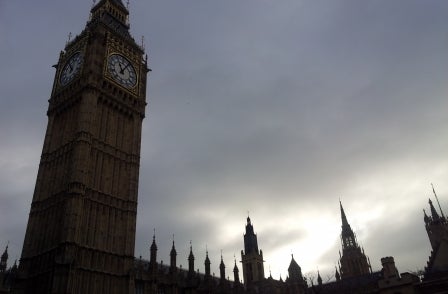
The Conservatives are facing the prospect of legislative deadlock unless they agree to demands to toughen up their plan for a Royal Charter to underpin press regulation.
In what is expected to be a crunch week in the long and complex debate over implementing the Leveson recommendations, both the Crime and Courts Bill and the Regulatory Reform Bill could have Leveson-law amendments tagged on to them
The long-awaited Defamation Bill has already been placed into legislative limbo after having a Leveson-law amendment passed by the House of Lords, meaning the Conservatives are now refusing to give it time to clear the final legislative hurdle and go forward for the Royal Assent.
Meanwhile, new cross-party talks on press regulation are taking place today, with the party leaders set to get involved tomorrow if agreement cannot be found.
The Conservatives and Lib Dems have both said they are not against the idea of a Royal Charter to establish a recognition body for the new industry-run press regulator.
But the main sticking points appear to be on the independence of the recognition panel – the body created by the charter to effectively licence the new regulator – and the extent the charter would be protected from future alteration by ministers.
Under the Tory plan, the press industry would have one representative on the recognition panel. In his report, Lord Leveson said the panel must be “independent of the press, independent of Parliament and independent of the Government”.
Labour and the Lib Dems may also insist on a legislative element to ensure that the terms of the Royal Charter are set in stone. Constitutionally speaking a Royal Charter is thought to be inherently weaker than legislation.
At the weekend the Lib Dems agreed a motion at their Spring Conference backing a Royal Charter if it:
- Was fully protected in statute from executive interference.
- Delivered the Leveson conditions for effective self-regulation in full.
- Was accompanied by statute to fully implement necessary incentives on costs, exemplary damages and data protection.
- Fully implemented Leveson’s recommendations on how the recognition process should work.
The Enterprise and Regulatory Reform Bill is today in the House of Lords at the Report Stage. Among other things it makes provision for a green investment bank. Crossbench peer Lord Skidelsky has tabled an amendment to it which would enshrine the Leveson recommendations in law.
The Crime and the Courts Bill goes to the Commons at the Report stage on Wednesday and, according to The Guardian, MPs are set to table a Leveson-law amendment to it which is likely to have cross-party support.
Meanwhile the press industry is pressing on with the creation of its new regulator.
Last Thursday PCC chairman Lord Hunt said that the new regulator would be "Leveson compliant" and that arguments about the composition of the recognition panel for the regulator were, effectively, putting the cart before the horse.
He revealed that former head of the Supreme Court Lord Phillips of Worth Matravers has appointed a “foundation group” on behalf of the press industry which will in turn create the appointments body which will recruit the board for the new regulator.
The members of that foundation group have yet to be publicly released.
But they have been named in The Times and The Guardian as:
- Sun associate editor Trevor Kavanagh
- Former Times editor (now a columnist for The Guardian and Evening Standard) Simon Jenkins
- Former Labour culture secretary Lord Smith of Finsbury
- Former cabinet secretary Lord Butler of Brockwell
- And former editor of ITN Sue Tinson.
Email pged@pressgazette.co.uk to point out mistakes, provide story tips or send in a letter for publication on our "Letters Page" blog
